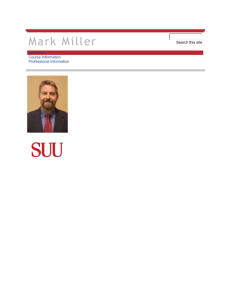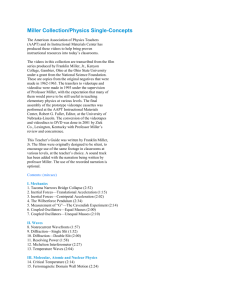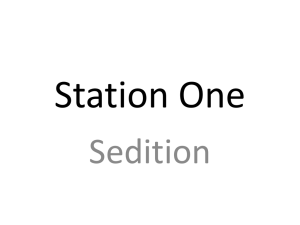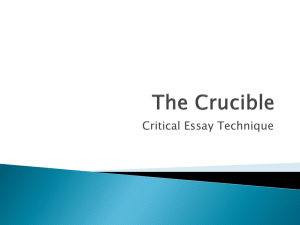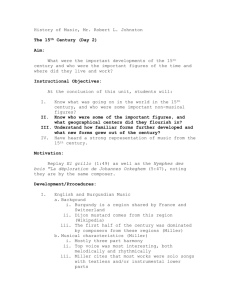How did a war fought to 'save the world for democracy' end up
advertisement
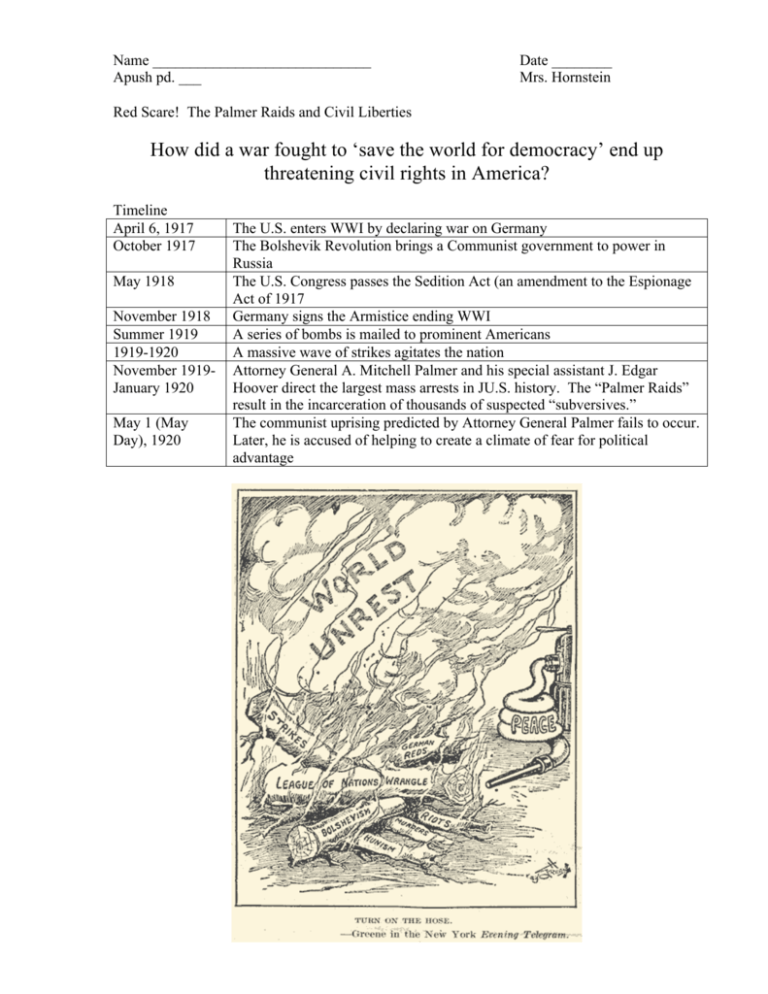
Name _____________________________ Apush pd. ___ Date ________ Mrs. Hornstein Red Scare! The Palmer Raids and Civil Liberties How did a war fought to ‘save the world for democracy’ end up threatening civil rights in America? Timeline April 6, 1917 October 1917 May 1918 November 1918 Summer 1919 1919-1920 November 1919January 1920 May 1 (May Day), 1920 The U.S. enters WWI by declaring war on Germany The Bolshevik Revolution brings a Communist government to power in Russia The U.S. Congress passes the Sedition Act (an amendment to the Espionage Act of 1917 Germany signs the Armistice ending WWI A series of bombs is mailed to prominent Americans A massive wave of strikes agitates the nation Attorney General A. Mitchell Palmer and his special assistant J. Edgar Hoover direct the largest mass arrests in JU.S. history. The “Palmer Raids” result in the incarceration of thousands of suspected “subversives.” The communist uprising predicted by Attorney General Palmer fails to occur. Later, he is accused of helping to create a climate of fear for political advantage 1. October 1917: The Bolshevik Revolution brings a Communist government to power in Russia. What are three important ways that the Soviet communist system was different than the American system? 2. Why might many Americans have been afraid of the Soviet Communist government? 3. In 1919 and 1920, the U.S. was shaken by a series of big labor strikes. Why did some Americans who opposed the strikes link the workers with radicals (communist revolutionaries whose real aim in striking was to destroy the American government and create a communist state)? In the dramatic 1919 steel strike, 350,000 workers walked off their jobs and crippled the industry. The U.S. Senate Committee on Education and Labor set out to investigate the strike while it was still in progress. In his testimony before the committee, Clairton worker George Miller called the 1919 strike a quest for “a standard American living”—a phrase that was particularly meaningful to the Serbian-born Miller. STATEMENT OF GEORGE MILLER Mr. MILLER. Well, if I got sickness in my home, he want to lay me off, if they can not get a man in my place, and I have sickness in my home, then if I go home, he will lay me off. When they get a man in my place, they tell me, “Go ahead and stay home. ”If my family gets sick and I ask my foreman that I want off that day, because my woman is sick at home, he say “All right,” and he will go around and get another man if he can, and if he can not he will let me off. The next day I will come back and there will be a man in my place and I say to him “My woman is better.” He will say “You can go home and stay home.” The CHAIRMAN. Is that the way the others are treated? Mr. MILLER. That is the treatment of every other worker. The CHAIRMAN. The complaint is that the bosses do not treat you right. Is that what you mean? Mr. MILLER. Yes, sir. Senator MCKELLAR. Do you mean that you do not get off when there is sickness in your family and distress in your family? And when you do have a man take your place, they discharge you? Mr. MILLER. They say, “Go home and stay home if you want to.” The CHAIRMAN. Don’t they allow you go come back to work? Mr. MILLER. Not if they get another man in your place. Senator MCKELLAR. What pay do you think you are entitled to? Mr. MILLER. Well, there is not enough money for the workmen. We work 13 hours at night and 11 hours at day, and we get 42 cents an hour. Senator MCKELLAR. And how much is that a day? Mr. MILLER. For a 12-hour day it makes $4.20 and for the longer day it makes $5.04. Senator MCKELLAR. A day? Mr. MILLER. Yes, sir. Senator MCKELLAR. Why did you strike? Mr. MILLER. Why did we strike? We did not have enough money so that we could have a standard American living. The CHAIRMAN. Have you figured out how much an hour you want. Mr. MILLER. It should be more than that. Senator MCKELLAR. More than 42 cents an hour? Mr. MILLER. Yes; I have a wife and two children? Senator MCKELLAR. Yes. Mr. MILLER. And take all I make and I can not put one penny aside, and if my family gets sick and I call a doctor, he won’t come down for nothing, and I do not make enough money to pay a doctor and he won’t come for nothing. Senator MCKELLAR. And your complaint is that the conditions are harsh, in the first place, and the wages are not high enough? Mr. MILLER. Well, there is another thing. If I get in the mill but three quarters of a minute late in the morning, they take off an hour, off of me. Then if I stay five minutes over the hour I should quit in the mill, they won’t give me an hour for the five minutes at all. Senator MCKELLAR. Do they allow you anything for the five minutes? Mr. MILLER. No sir; they won’t allow me anything for the five minutes. They won’t allow anything. They will take it off of me if I am a minute late, but they won’t give me anything if I work five minutes overtime. The CHAIRMAN. How long have you worked at the mill? Mr. MILLER. Thirteen years. Senator MCKELLAR. And what is your nationality? Mr. MILLER. I am a Serbian. Senator MCKELLAR. And are you a naturalized American citizen? Mr. MILLER. I believe I am. Senator MCKELLAR. And you have a right to vote in this country, have you? Mr. MILLER. Why, yes. The CHAIRMAN. I see that there are quite a number of gentlemen around here, and I am going to ask them how many of them are American citizens and those that are American citizens I will ask to hold up their hands, so that we can see how many are here. How many have got your full naturalization papers, your American citizenship papers? (The above was repeated to the crowd through an interpreter, and three of those assembled held up their hands.) A VOICE. There are plenty of American citizens out on strike at their homes. The CHAIRMAN. Now gentlemen, we want to treat you all exactly alike. We want to treat the mill owners and the men alike; and we want to find out the exact conditions here. That is the idea of this committee. Source: Investigation of Strike in Steel Industries, Hearings before the Committee on Education and Labor, United States Senate, 66th Congress, 1st Session. 4. Based on what you read in the above document, do you believe the workers had the right to strike? 5. According to the cartoonist, what effect may the strikes have on America? In the summer of 1919, a number of bombs were sent throughout the mail to influential Americans like J.P. Morgan and John D. Rockefeller. A wave of fear swept across the country. 6. What effect did the bombs have on Americans’ perceptions of radicals? After a bomb blew up in front of U.S. Attorney general A. Mitchell Palmer’s home in Washington, D.C., he used laws that had been passed during the war to launch a campaign against those he suspected of being subversives. Sedition Act Excerpt: “Whoever, when the United States is at war, shall willfully make or convey false reports or false statements with intent to interfere with the operation or success of the military or naval forces of the United States, or to promote the success of its enemies… or incite insubordination, disloyalty, mutiny, or refusal of duty, in the military or naval forces of the United States, or shall willfully obstruct… print, write, or publish any disloyal, profane, scurrilous, or abusive language about the form of government of the United States, or the constitution of the United States, the military or naval forces of the united states… or shall willfully display the flag of any foreign enemy, or shall willfully… urge, incite or advocate any curtailment of production… or advocate, teach, defend, or suggest the doing of any of the acts or things in this section enumerated and whoever shall by word or act support or favor the cause of any country with which the United States is at war or by word or act oppose the cause of the United States therein, shall be punished by a fine of not more than $10,000 or imprisonment for not more than twenty years, or both.” 7. List three particular activities made illegal by the Sedition Act (in your own words). 8. What do all these crimes have in common? 9. Can you think of any circumstances under which someone might engage in one of the prohibited activities listed above without being a traitor to the United States? 10. How might the Sedition Act and the First Amendment to the Constitution be in conflict? 11. How do you think Attorney General Palmer might have responded in 1919 if someone had pointed out that the First Amendment and the Sedition Act seemed to be in conflict? 12. In your opinion, when, if ever, does the government have the right to suppress free speech and nullify the First Amendment? 13. Why were these people arrested and deported? Many Americans’ feelings about the Palmer Raids and suspected “subversives” were probably influenced by statements made by government officials like Palmer. Here is how Palmer himself explained his actions in 1920, in an essay called “The Case Against the ‘Reds’”. “My information showed that communism in this country was an organization of thousands of aliens who were direct allies of Trotzky [a leader of the Russian Communist Revolution and the Soviet Union]… it showed that they were making the same glittering promises of lawlessness, of criminal autocracy to Americans that they had made to the Russian peasants. How the Department of Justice discovered upwards of 60,000 of these organized agitators of the Trotzky doctrine [Communism] in the United States is the confidential information upon which the Government is now sweeping the nation clean of such alien filth.” 14. According to Palmer, who was working together with the communists in America against the United States? 15. Does Palmer explain how the United States government got the information it used to pursue suspected “subversives”? 16. Who is Palmer referring to when he says the government will sweep America clean of “alien filth”? 17. Why do you think he describes the aliens as “filth”? How is Palmer trying to influence his readers’ opinions by using such terms? By the summer of 1920, the public gradually lost interest in Palmer and his campaign against subversives, in part because he predicted a series of terrorist attacks that failed to occur. The paranoia that had gripped America for over a year passed and Palmer was criticized for his actions. The Palmer Raids and Red Scare paranoia did, however, frustrate the labor movement’s attempt to increase its influence in the United States. The Red Scare also helped convince many Americans to support a dramatic change in the nation’s immigration policy. Until the early 1920s, the United States had very few laws that stopped immigrants from coming here (racist regulations that restricted the entry of Asians, especially Chinese, were the great exception). In 1924, however, America became a “gatekeeping” nation for the first time, closing its doors to most Central and Eastern European immigration. 18. What is the message that the author is attempting to communicate to the reader? 19. How do you think this cartoon might have influenced the decision to drastically decrease immigration to the United States in 1924? 20. How did this increasing fear of anarchists and immigrants lead to the Sacco and Vanzetti case? Ben Shahn created this poster to protest the execution of Bartolomeo Vanzetti and Nicolo Sacco who were electrocuted in 1927. He chose as the text a statement Vanzetti made to a reporter shortly before their deaths. Conclusion: How did a war fought to ‘save the world for democracy’ end up threatening civil rights in America?
